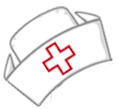
Licensed practical nurses (LPN), or licensed vocational nurses (LVN), help provide patient care under the direct supervision of registered nurses (RN) or physicians. Most of what they do day-to-day consists of basic bedside care. This may involve taking patients’ vital signs, bathing or dressing patients, addressing patients’ personal hygiene, preparing and giving injections, dressing wounds, and other similar tasks.
Providing care at this level can lead to a very rewarding career. However, if you are interested in furthering your career and expanding your scope of practice, there are many schools that offer online LPN/LVN to RN bridge programs to help you complete your degree and become a registered nurse quickly.
Degree Prerequisites
Before being admitted into a bridge program for an associate of science in nursing (ASN) degree, also known as an associates degree in nursing (ADN), there are a few steps that most institutions will require you to follow. Nursing school prerequisites may also vary according to the state that you’re in. For example, most LVN to RN programs in California require that you have completed Anatomy, Physiology, Microbiology, and Chemistry before being accepted into the program. Knowing what you are expected to provide and do can help you feel more prepared and speed up the admissions process. Keep in mind that the list below consists of the basic prerequisites, and that some schools may require additional information prior to admittance.
- Complete the schools’ admissions form and pay admissions’ fee.
- Send them your previous transcript.
- Give them a copy of any currently active nursing licences that you have already obtained (LPN/LVN, CNA, BNA, etc.).
- Fill out and submit your FAFSA and any other outside financial aid.
- Take the Test for Essential Academic Skills (TEAS), or equivalent entrance exam.
You may also need to take additional core classes and placement exams before you can be admitted into the bridge program. This will depend on both the classes that will transfer from your previous transcript and your TEAS score. A bridge program can last 1-2 years and also depends upon your previous coursework, testing scores, as well as how many classes/clinical hours you are able to take each semester.
TEAS and Supplemental Courses
The Test for Essential Academic Skills (TEAS) is a common placement exam used by many nursing educational institutions to determine where you should be placed within their ASN/ADN bridge program. Should you not pass the exam and/or have not taken the correct previous courses, these are the subjects that most LPN/LVN to RN bridge nursing programs will expect you to complete:
- Biology
- Microbiology
- Chemistry
- Math
- English
- Communication/Speech
- Psychology/Sociology
Once you are accepted into the program, you will begin to delve into a variety of healthcare and nursing-related topics like pharmacology, pathophysiology, medical-surgical nursing, family health nursing, professional nursing practice, and the list goes on. There are many different types of nurses, from LVN/LPNs to advanced practice nurses. Nursing programs strive to keep up with the ever-evolving healthcare industry by offering a wide variety of both core and elective classes.
Skills Lab and Clinical Hours

Many colleges and universities offer online and hybrid nursing programs. The core and elective classes can be taken online, and the skills lab and clinical hours would be completed at a physical location. While you will not be required to complete as many clinical hours in an associate program as you would for a bachelors or master’s program, it is still typical for a student to have at least two 8-hour shifts per week in a clinical setting for at least two semesters.
A skills lab is an area at either a school or hospital where nursing students can practice in a safe environment. The amount of hours and what you will be practicing in the skills lab will vary with each institution. You can expect to spend at least two semesters practicing the following procedures:
- Proper Hand-washing
- Vital Signs Assessment
- IV Maintenance
- Nasogastric (NG) Tube Insertion
There are many other techniques that you will be able to practice, as well as reacting to a variety of scenarios. Advanced lab skills will teach you how to react to everything from a patient having an asthma attack to a seizure. The skills labs will become more complex, should you choose to pursue higher levels of education.
Your Nursing Degree and What It Is Good For
Registered nurses have greater responsibilities than a LVN or LPN. In order to officially become a RN, you must pass the National Council Licensure Examination – Registered Nurse (NCLEX-RN) after earning your ASN/ADN. The bridge programs are typically accelerated, giving you the opportunity to advance in the workforce sooner than a non-bridge program. You can complete the coursework online for greater flexibility to cater to your busy schedule.
Once you have graduated, you will be qualified to work as a RN in any of these facilities:
- Schools
- Nursing Homes
- Hospitals
- Home Healthcare
- Correctional Facilities
- Physicians’ Offices
- Summer Camps
No matter where you work, you will be responsible for patient care, maintaining medical records, and giving healthcare advice to the patients and their families. You can also choose to pursue a specialized area of nursing such as critical care, neonatology, cardiovascular, and more. If you choose a specialty, you will need additional coursework and clinical hours in that area.
Registered Nurse Earning Potential

The salary you can earn as a registered nurse widely depends on a number of factors. Education, experience, location, and type of facility all play a role in determining your earning potential. The Bureau of Labor Statistics reported that the U.S. average salary for RNs was $69,790 in 2018. This is substantially higher than the average LPN salary, which is approximately $43,420.
Having an associate’s degree will absolutely increase your salary potential, as well as your employment organization and location. General hospitals and outpatient care centers are the two industries with the highest concentration of RNs. On average, outpatient care centers offer an annual salary of $72,390, which is slightly higher than general hospitals’ salary of $71,640.
If you want to earn more than the average RN without a bachelor’s or master’s degree, then you may need to move to another state. California is the top-paying state in the nation, with an average salary of $98,400 per year. Hawaii is the runner up in high average wages, rewarding RNs for their hard work at $88,230 annually. For more information about RN salary and employment, visit The Bureau of Labor Statistics’ website.
You can increase your involvement in patient care and overall potential in healthcare by becoming a registered nurse. Take a look around our website to learn more about nursing bridge programs and how to get started today.


